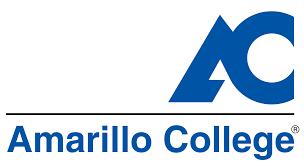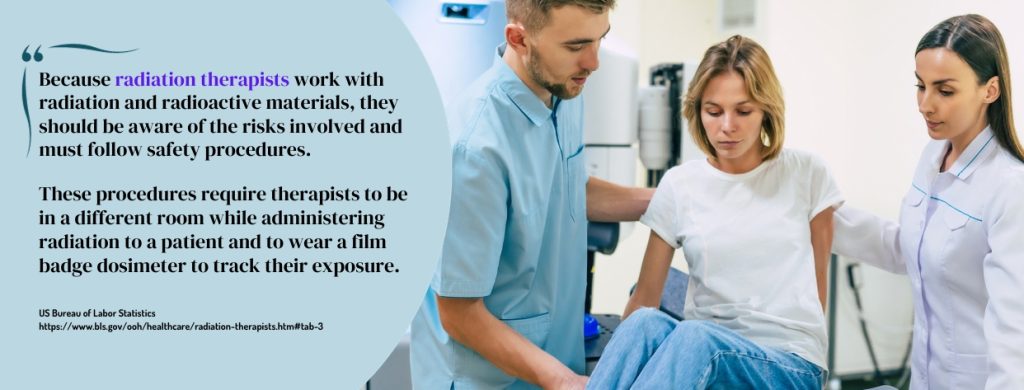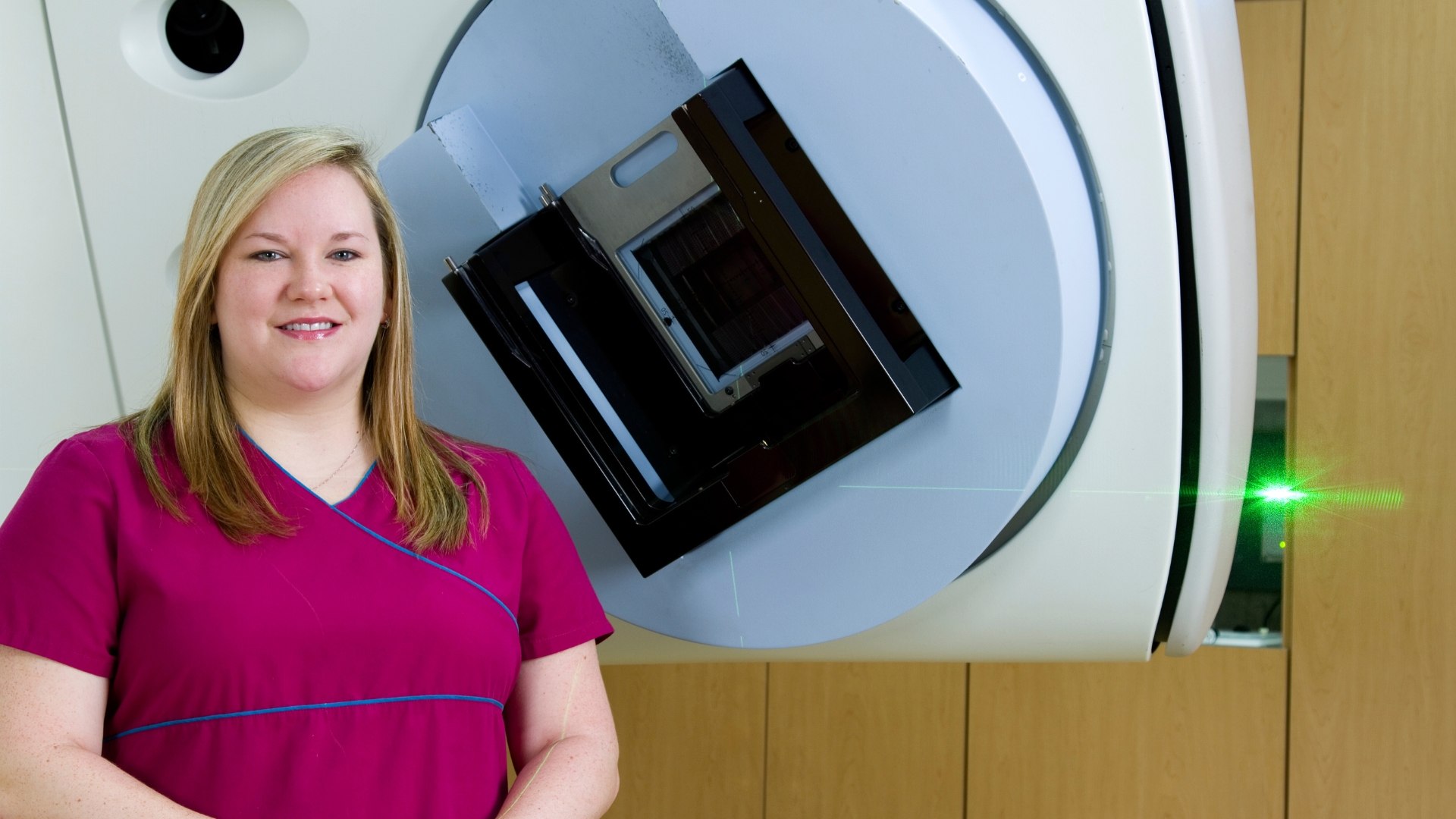Cancer remains the number one cause of death in the United States, with 1,958,310 new cancer cases to date and projected deaths at 609,820. The American Cancer Society Journal confirms that the majority of new cancer cases in America are affecting the male population, with most of them getting prostate cancer.
One of the most crucial breakthroughs being used to combat this dreaded disease today is radiation science, which paved the way for Radiation Therapy.
The National Cancer Institute defines radiation therapy, also called radiotherapy, as a type of cancer treatment that shrinks tumors and eradicates cancer cells using high-dose radiation.
What Does a Radiation Therapist Do?
Primarily, radiation therapists play a key role in the efficient operation of the radiation oncology department. In particular, they:
- Prepare and maintain the necessary equipment and treatment rooms, ensuring that they are operational.
- Review treatment plans and other parameters in preparation for radiation treatment.
- Keep electronic and paper records of patient treatments and setups using the appropriate applications.
- Perform quality assurance procedures and report problems to the physicist or supervisor.
Radiation therapists explain the radiation therapy procedure to patients. A radiation therapist also interacts with patients and their families to determine their physical and psychological needs. To this end, this specialized work is critical to patient care, helping cancer patients in their journey toward healing and full recovery.
Radiation therapists, therefore, must demonstrate proficiency in these specialized duties by completing top-rated online Radiation Therapy programs.
Methodology
Students need to take the time to carefully choose the medical school that offers an Associate in Radiation Therapy to ensure their money’s worth.
We have listed the top 5 Associate in Radiation Therapy programs that meet a rigorous evaluation. Check out the criteria we used to pick each of the schools below:
- Delivered fully online or hybrid to allow adult students with other commitments to pursue an associate’s degree without disrupting their schedule,
- Features basic courses like Patient Care, Human Anatomy and physiology, Introduction to Radiation Therapy, and Radiobiology to prepare students for challenging entry-level roles,
- Equips students with the fundamental knowledge of the field so they can proceed to earning a bachelor’s degree in radiation therapy, or other related fields such as sonography or nuclear medicine technology,
- May provide students with clinical work opportunities for hands-on experience in radiation therapy centers,
- Prepares students for the American Registry of Radiologic Technologists (ARRT) examination, and other Radiation Therapy certificate programs,
- Offers additional support services, including online library services, one-to-one mentoring, job placement programs, and academic counseling,
- Provides financial aid and transfer credit opportunities to reduce the total expenses,
- Obtained appropriate accreditation from the American College of Radiation Oncology (ACRO) and the Joint Review Committee on Education in Radiologic Technology (JRCERT) to ensure that the academic institution meets and maintains the minimum quality standards in academics and related services.
5 Top Associate Programs in Online Radiation Therapy Schools
Cambridge College of Healthcare & Technology

- Location: Atlanta, Georgia; Delray Beach, Florida; Miami Gardens, Florida; Altamonte Springs, Florida
- Online Delivery Method: Online + In-person
- Time It Takes to Complete: 2 years
- Completion Rate: undisclosed
- Types of Aid: Pell Grants, Direct Subsidized Stafford Loans, Direct Unsubsidized Stafford Loans, Direct PLUS Loans, Florida Student Assistance Grant (FSAG), Florida Bright Futures Grant, Workforce Investment Act (WIA), 529 Prepaid College Plans, Veteran Benefits, and Scholarships
There are many reasons why students should choose Cambridge for their Radiation Therapy associate’s degree. For one, it has a hybrid approach to learning, which means that courses are offered online and on campus to ensure students will have the flexibility they need to work, play, and live and, at the same time, earn an associate’s degree.
For another, this program emphasizes the knowledge needed to complete this degree and obtain the skills to become effective and efficient radiation therapists in just two years.
Another reason to enroll in Cambridge College of Healthcare & Technology’s Associate in Radiation Therapy is that this program prepares students for the ARRT Registry Examination, certifying radiation therapists to be eligible to work in healthcare facilities. Through this program, students will learn both practical and theoretical skills from experienced instructors and well-equipped in-person laboratories.
Upon graduation, students will be more than qualified to work with a radiation oncologist in preparing and sterilizing radiation therapy rooms, applying ionizing radiation therapy to patients, and monitoring and documenting radiation treatments.
These are some of the course requirements in this accredited radiologic technology program are:
- Introduction to Health Science
- Orientation to Radiation Therapy & Patient Care
- Radiation Biology & Protection
- Sectional Anatomy & Imaging Principles
- Introduction to Clinical Radiation Therapy & Operations
Connecticut State Community College

- Location: New Haven, Connecticut
- Online Delivery Method: Online/Hybrid
- Time It Takes to Complete: 20 months
- Completion Rate: undisclosed
- Types of Aid: Scholarships, Grants, Student Loans, and Work-Study Programs
To become qualified to work as a radiation therapist, the first step students need to take is to earn an associate’s degree. At CT State Community College, students can enroll in its Associate of Science in Radiation Therapy degree program. This Joint Review Committee on Education in Radiologic Technology-accredited program will train students to become qualified and compassionate Radiation Therapy practitioners in the community.
This AS in Radiation Therapy program teaches students to use high-energy X-rays to treat cancer and other diseases. They will learn how to use highly specialized computerized equipment to target abnormal cells and, at the same time, minimize their side effects. They will also be taught how to administer, monitor, and record the course of treatment as prescribed by the radiation oncologist.
Throughout the program, students learn to assess patients’ physical and emotional needs and make the necessary referrals. This online degree program combines interpersonal and technical skills and opens a wide range of career opportunities, including applications specialist, education, dosimetry, management, sales, and technology-related roles.
Courses for this program require synchronous interactions between students and professors. However, clinical rotations, laboratory, and research activities may be completed at affiliated clinics under the supervision of trained clinical staff.
The following are some of the required courses for CT State Community College’s Radiation Therapy program:
- Anatomy & Physiology
- Principles and Practices of Radiation Therapy
- Radiologic Science Physics
- Understanding Cancer
- Radiation Oncology
To earn an associate degree, students must complete all didactic and clinical curricula with a final grade of at least “C.” They will need to complete all competency exams with a final grade of 100%. Plus, they will need to comply with all program and hospital standards as outlined in the program handbook.
After graduation, Radiation Therapy students will be prepared for the theoretical, psychological, and technical aspects of the field. They will also be eligible for the American Registry of Radiologic Technologists (ARRT) certification exam.
Amarillo College

- Location: Amarillo, Texas
- Online Delivery Method: Online
- Time It Takes to Complete: 5 semesters
- Completion Rate: undisclosed
- Types of Aid: Sybil B. Harrington Scholarship, 3rd Party Scholarships, Grants, Loans, and Veteran Benefits
Amarillo College’s Associate in Applied Science in Radiation Therapy degree program is an ideal first step for those looking to have a rewarding career as a radiation therapist, someone who provides the care and support needed by those who have cancer. This program is fully accredited by JRCERT. It is a 1982 joint venture between Amarillo and Harrington Cancer Center.
AAS in Radiational Therapy students at Amarillo must take all the major course requirements in sequential order at the advice of the department advisor. Students are also required to achieve a grade of at least “C” to complete the program satisfactorily. Only students who receive an unsatisfactory grade, have dropped, or have withdrawn from the RADT/RADR course can re-enroll once.
Major course requirements for this Radiation Therapy degree include:
- Introduction to Radiation Therapy
- Technical Procedures
- Technology Research
- Dosimetry
- Oncology
To qualify for graduation, students need to complete all required courses in the official Radiation Therapy curriculum. Sometimes, students may be allowed to make course substitutions given that it has permission from the Program Director, Vice-President of Academic Affairs, and Dean of Health Sciences.
After receiving the Associate in Applied Science in Radiation Therapy degree, students will be eligible to take the national certification exam through ARRT.
Bellevue College

- Location: Bellevue, Washington
- Online Delivery Method: In-person
- Time It Takes to Complete: 24 months
- Completion Rate: undisclosed
- Types of Aid: Federal Pell Grant, Federal Supplemental Educational Opportunity Grant (FSEOG), Federal Work-Study Programs, Federal Direct Student Loan, Federal Parent Direct PLUS Loan, Washington College Grant, Washington College Bound Scholarship, Washington Bridge Grant, State Work-Study Programs, Workforce Education Grants, BC Institutional Waiver, BC Institutional Grant, and BC Foundation Scholarships
Bellevue College’s Associate of Applied Science in Radiation Therapy degree is a full-time degree designed for students without any prior experience in the field. This program prepares students to become vital members of cancer teams who provide radiation treatments as prescribed and instructed by the radiation oncologist.
Radiion Therapy students will be trained to assist in treatment planning procedures using computerized treatment planning, dosimetry, and simulation. They will be taught how to maintain accurate treatment records, provide comfort and support to patients, and assess patients’ psychosocial needs.
Bellevue College’s Radiation Therapy degree is the only radiation therapy technology program in the state of Washington and is JRCERT-accredited. Through this program, students get access to personalized and intensive instructions to develop a strong foundation for successful careers in the field of Radiation Therapy.
At the end of the program, students will be adept at interpreting planned courses of radiation therapy and accurately administering them. They will be skilled in providing patient care and ensuring patient comfort during radiation therapy procedures.
Furthermore, students studying Radiation Therapy will know how to apply the principles of radiation safety. They will be confident in operating radiation therapy equipment safely and efficiently. They will be skilled in demonstrating professional attitudes in the work environment, allowing them to work harmoniously with other medical professionals. Plus, they can identify the functions of radiation therapy equipment and determine the best way to utilize it.
Core courses for Bellevue College’s Associate in Radiation Therapy program include:
- Principles of Dose Calculation
- Safety for Healthcare
- Imaging and Processing in Radiation Oncology
- Radiologic Sciences Patient Care
- Principles of Simulation
Northwestern Health Sciences University

- Location: Bloomington, Minnesota
- Online Delivery Method: Online + In-person
- Time It Takes to Complete: 2+ years
- Completion Rate: undisclosed
- Types of Aid: Institutional Scholarships, External Scholarships, Federal and State Grants, and Veteran’s Benefits
Northwestern Health Sciences University’s Associate of Science in Radiation Therapy degree is JRCERT-accredited. It trains students to become crucial members of the oncology team that supports patients and be an expert in the use of the latest radiation therapy technology.
Radiation Therapy students at NWHSU are guaranteed small classes to ensure they can get personalized help whenever they need it. Coursework includes subjects like anatomy, physics, and mathematics. Students will be required to complete all lab work and coursework in the campus’ modern laboratory.
Once completed, students will then begin their nine-month clinical training, allowing them to have hands-on training that will give them confidence when they enter their clinical education.
Upon graduation, students will be experts in delivering high-quality patient care, interpreting treatment plans, administering radiation treatments, and reviewing and evaluating imaging. They will learn how to use linear accelerators to accurately target the site of cancer and other diseases with radiation.
Learners will also be taught how to use advanced technology and follow safety precautions for protection. Moreover, they will learn how to work directly with patients and with other members of the patient care team. In other words, they will be trained to help patients win their fight against cancer and improve their quality of life.
Here are a few courses included in the Radiation Therapy curriculum:
- Radiation Protection
- Treatment Planning
- Sectional Anatomy
- Computer Literacy & Research Methodology in Radiation Oncology
Types of Radiation Therapy
Radiation therapy removes cancer cells from a patient’s body, while slowing down their growth and preventing cancer from returning.
Radiation Therapy is performed as two main types of treatment procedures: External Beam Radiation and Internal Beam Radiation.
External Beam Radiation
Using a machine that aims radiation at the site of the tumor, external beam radiation is a local treatment, ensuring that it can target a specific part of the body. External beam radiation is used not only to stop the growth of tumors but also for pain relief and management bowel or bladder control problems, breathing issues, and other associated health concerns.
Internal Beam Radiation
Internal radiation therapy, on the other hand, is categorized as systemic therapy and brachytherapy, wherein a liquid or solid source of radiation, respectively, is put inside the body. Both processes are aimed at killing the cancer cells they come across. Systemic radiation therapy can be used to treat pain in cancer that has spread to the bone.
Which Radiation Therapy Applies to What?
To determine the correct type of radiation therapy to use on a cancer patient, radiation therapists need to consider the tumor size, location, proximity to normal tissues and the type of cancer.
A patient’s overall well-being and medical history are also taken into account. It is equally important to determine the patient’s age, other medical conditions and cancer treatments previously administered, if any.
Licensure and Certification for Radiation Therapists
After receiving an associate degree in Radiation Therapy, graduates become eligible for state licensure and national certification.
If they pass the examination, radiation therapists will earn the ARRT credentials in Radiation Therapy, which is to recognize those who are qualified to perform the responsibilities of a radiation therapist.
Before students can take the examination for ARRT credential and registration, though, they must first demonstrate didactic and clinical competencies in a formal classroom. This requires them to meet the Professional Education Requirements specified by ARRT to prove that the applicants have developed fundamental knowledge and effective critical thinking skills and are able to integrate theory into practice.
Certified Radiation Therapist (RT) certifications need to be renewed every two years. Aside from that, they must accumulate 24 continuing education credits. Every ten years, RTs will need to verify their continuing qualification requirements through ARRT. Plus, they will need to complete a structured self-assessment and professional profile along with continuing education credits.

Frequently Asked Questions About Associate in Radiation Therapy Schools
What else can graduates with an Associate in Radiation Therapy degree do?
Besides becoming a radiation therapist, associate degree holders can also pursue these careers:
Cardiovascular Technologists and Technicians
Cardiovascular technologists and technicians are responsible for conducting tests on cardiovascular or pulmonary systems for research, therapeutic, and diagnostic purposes. They will also assist in electrocardiograms, pulmonary functions, lung capacity, cardiac catheterization, and other similar tests.
Physical Therapist Assistants
Physical therapist assistants help physical therapists assist patients in regaining movement and managing their pain due to illness or injury. Their work involves operating rowing machines, stationary bikes, and other therapeutic tools. They may work in offices or hospitals. At times, they work closely with Respiratory Therapists for patients fighting breathing issues or lung cancer treatments.
Radiologic and MRI Technologists
Radiologic and MRI technologists perform diagnostic imaging examinations to produce images that physicians use for diagnosing illnesses. They usually work in healthcare facilities and hospitals.
Other advanced roles in radiation therapy can be attained by enriching your credentials beyond an associate’s or bachelor’s degree.
What are the most important skills radiation therapists need?
Online Radiation Therapist trade schools produce students who are adept in operating medical imaging equipment. While technical aptitude is a priority skill, they must also be critical thinkers and problem-solvers with strong analytical skills. Attention to detail and strong knowledge of safety protocols matter, too!
Communication and interpersonal skills are a must, as well, because radiation therapists speak with patients and work with a team on a daily basis.
How much do radiation therapists make?
The American Labor Statistics Bureau says radiation therapists earn an annual median wage of $98,340, depending on the industry they are connected to.
In outpatient care centers, for example, radiation therapists can earn up to $125,000 annually. Medical and diagnostic laboratories offer $106,100, while specialty hospitals pay radiation therapists an annual median wage of $106,900.
Can radiation therapists expect career stability?
The BLS also discloses that the employment of radiation therapists will grow by 2% until 2032—or bring about 700 jobs annually on average.
Did you know that experts see an apparent rise in the number of cancer cases in the next few years? The National Cancer Institute also estimates a significant growth in cases of metastatic breast, colorectal, bladder, lung, and prostate cancer in America until 2025. Similarly, a National Center for Biotechnology Information (NCBI) study projects the annual number of patients receiving radiation therapy to rise by 19% from 2015 to 2025.
All these point to a steady demand for radiation therapy experts, making this career path a promising option for students looking to be part of the medical and healthcare sector without spending decades in school.
For more valuable information, see the following:

